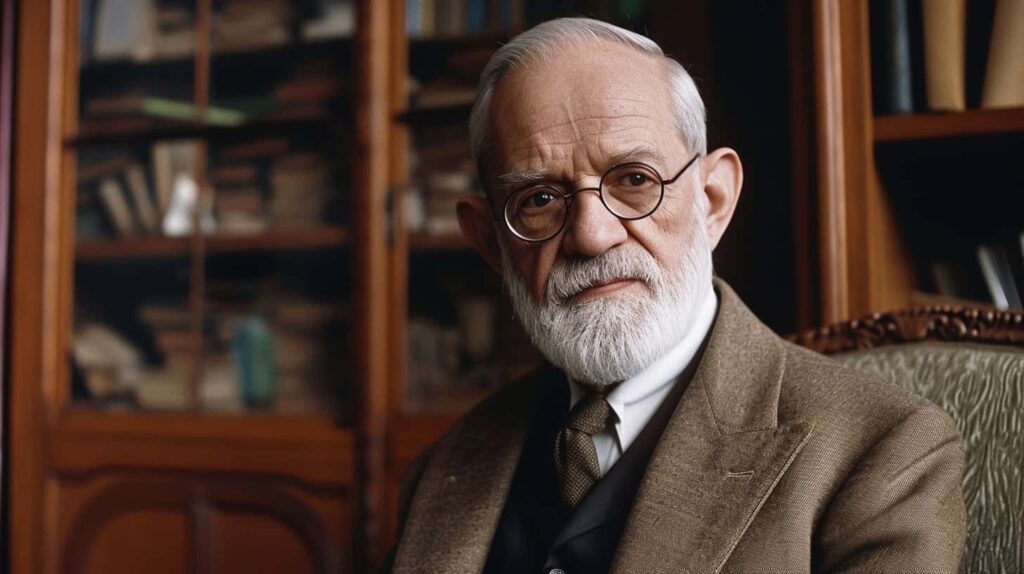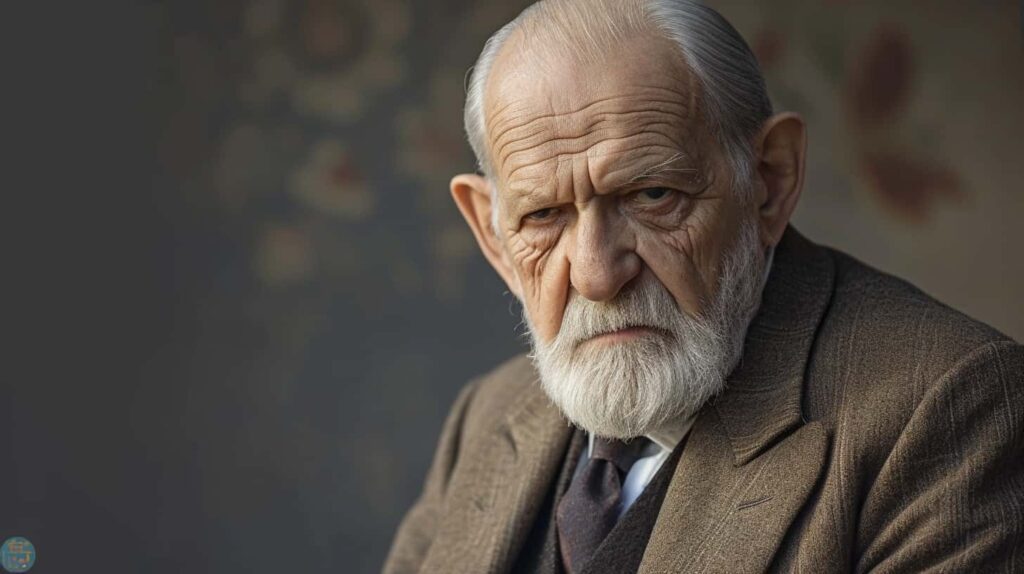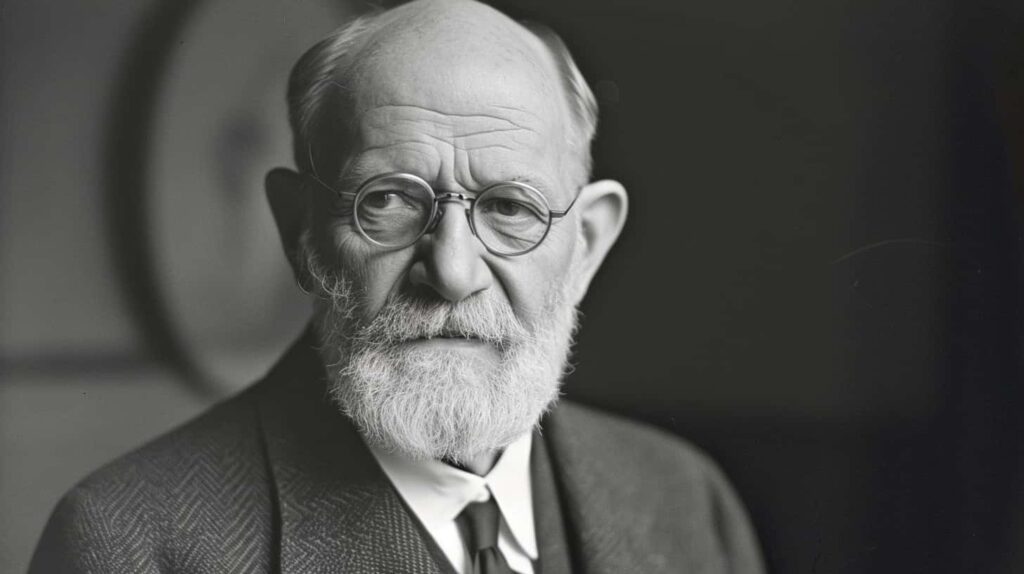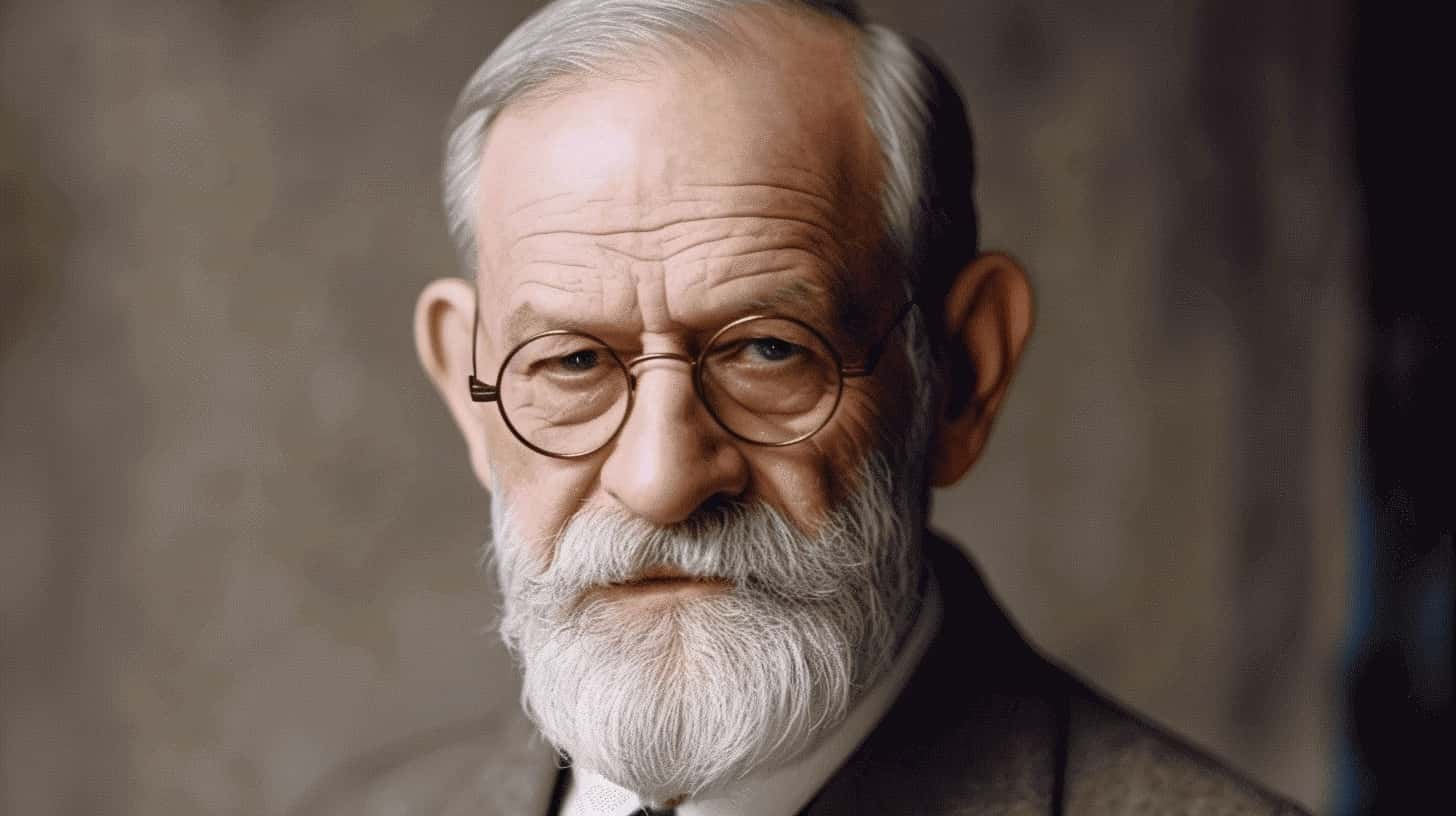Exploring the world of thought leaders brings us to the significant contributions of Sigmund Freud. This Austrian psychologist, celebrated for his pioneering concepts, has made a lasting impact on psychology.
Through his extensive exploration of the human mind and its intricacies, Freud unraveled the complexities of the unconscious, dream interpretation, and the interplay between the ego and the id. He delved into the depths of childhood development, shedding light on the mechanisms of repression and defense. Freud fearlessly explored taboo subjects such as sexuality and the Oedipus complex, challenging societal norms and encouraging a deeper understanding of human behavior.
Additionally, his thoughts on religion and civilization sparked intellectual discourse. Join us as we uncover the profound wisdom encapsulated within Sigmund Freud’s quotes, offering a glimpse into the profound depths of the human psyche.
Key Takeaways
- Sigmund Freud revolutionized psychology with his theories on the unconscious mind and dreams.
- Freud’s Dream Theory suggests that dreams reveal repressed desires and unresolved conflicts.
- The unconscious mind influences behavior, thoughts, and emotions, and understanding it is crucial for mental well-being.
- Freud’s concepts of the ego and the id continue to shape the field of psychology.
The Unconscious Mind
The Unconscious Mind plays a pivotal role in Sigmund Freud’s psychoanalytic theory, as it encompasses thoughts, memories, and desires that are beyond our conscious awareness. This complex and mysterious part of our mind influences our behavior, thoughts, and emotions, even though we may not be aware of it.
Understanding the Unconscious Mind is crucial for comprehending cognitive processes and mental health. According to Freud, the unconscious mind is the reservoir of repressed thoughts, memories, and desires that have been pushed out of conscious awareness due to their disturbing or unacceptable nature. These unconscious contents can manifest themselves in various ways, such as through dreams, slips of the tongue, or even in our everyday behavior.
By exploring the unconscious mind, Freud believed that individuals could gain insight into their thoughts, emotions, and behaviors. This process, known as psychoanalysis, aims to bring these unconscious contents into conscious awareness, allowing individuals to address and resolve any underlying conflicts or issues.
Understanding the role of the unconscious mind in cognitive processes and mental health is essential for individuals seeking mastery over their thoughts and emotions. By uncovering and addressing unconscious contents, individuals can gain a deeper understanding of themselves and work towards improved mental well-being.

Dreams and Interpretation
Freud’s Dream Theory suggests that dreams are a manifestation of repressed desires and unresolved conflicts from the unconscious mind. According to Freud, dreams serve as a way for the unconscious to communicate with the conscious mind through symbolism. By interpreting the symbols in dreams, Freud believed that one could gain insight into their hidden desires and unresolved issues.
Freud’s Dream Theory
Freud revolutionized the field of psychology with his groundbreaking theories on dreams and their interpretation. One of his most influential contributions was his dream theory, which emphasized the role of unconscious desires in shaping our dreams.
According to Freud, dreams serve as a window into the unconscious mind, allowing us to gain insight into our deepest desires and fears. Through dream analysis, Freud believed that individuals could uncover repressed memories and unresolved conflicts, leading to a better understanding of their psychological well-being.
He argued that dream symbols and imagery were meaningful representations of our unconscious thoughts and emotions. By decoding these symbols, therapists could help individuals uncover hidden meanings and achieve personal growth.
Freud’s dream theory laid the foundation for modern approaches to dream analysis and continues to shape the field of psychology today.
Symbolism in Dreams
Symbolism in dreams is a fundamental aspect of understanding the hidden meanings behind our subconscious thoughts. According to Freud’s theories on dreams and the unconscious mind, dreams are a manifestation of repressed desires and unresolved conflicts. Symbolism serves as a tool for our unconscious mind to express these hidden thoughts and emotions.
Here are four key points to consider regarding dream symbolism and interpretation:
- Symbols are personal: The meaning of symbols in dreams varies from person to person, as they’re influenced by individual experiences and memories.
- Universal symbols: While personal symbolism is subjective, there are also universal symbols that hold similar meanings across cultures and societies.
- Interpretation is key: Understanding dream symbols requires interpretation and analysis to unlock their hidden messages and insights.
- Context matters: The context of the dream, including emotions and events, can provide valuable clues for interpreting dream symbols.
The Ego and the Id
The concept of the Ego and the Id is a fundamental component of Sigmund Freud’s psychoanalytic theory, exploring the dynamic interplay between the conscious and unconscious mind. The ego, according to Freud, is the part of our psyche that mediates between our primitive desires and the demands of society. It develops as we navigate the challenges of our early years, learning to balance our instincts with the constraints of the external world.
Freud believed that the ego is shaped through a process of ego development, which involves our interactions with our caregivers and the social environment. As children, we encounter various conflicts and challenges that require us to adapt and find ways to gratify our desires while conforming to societal norms. This process of ego development allows us to develop a sense of self, a coherent identity that guides our thoughts, feelings, and behaviors.
On the other hand, the id represents our unconscious desires and instincts. It operates on the pleasure principle, seeking immediate gratification without regard for morality or consequences. The id is the source of our primal drives, such as hunger, thirst, and sexual desires. According to Freud, the ego acts as a mediator between the id and the external world, finding ways to satisfy our desires in socially acceptable ways.
Understanding the interplay between the ego and the id helps us comprehend the complex dynamics of human behavior. By analyzing these two components, Freud sought to uncover the underlying motivations and conflicts that shape our thoughts and actions. This knowledge can provide valuable insights into our unconscious desires and help us navigate the complexities of our own minds.

Childhood and Development
Freud’s theory of psychosexual stages suggests that our early experiences play a significant role in shaping our development. According to Freud, children go through different stages, such as the oral, anal, and phallic stages, where they focus their energy on different erogenous zones. These stages can have a lasting impact on our personality and behavior as adults.
Understanding the influence of childhood experiences is crucial in Freud’s psychoanalytic approach to psychology.
Freud’s Psychosexual Stages
During childhood and development, individuals go through a series of psychosexual stages, as theorized by Sigmund Freud. These stages are characterized by the focus on different erogenous zones and the conflicts that arise from the interaction between unconscious desires and societal expectations.
Here are the four key psychosexual stages proposed by Freud:
- Oral Stage: This stage occurs from birth to around 18 months, where infants derive pleasure from sucking and biting. The primary conflict revolves around weaning off breastfeeding or bottle-feeding.
- Anal Stage: From around 18 months to 3 years, the focus shifts to the pleasure derived from bowel movements and control. Toilet training becomes a crucial conflict during this stage.
- Phallic Stage: Between the ages of 3 and 6 years, children become aware of their genitals and develop unconscious desires towards the opposite-sex parent. This stage is marked by the Oedipus complex for boys and the Electra complex for girls.
- Latency and Genital Stages: These stages occur during the school-age years and adolescence, respectively, where sexual desires become dormant and then reemerge in a mature and socially acceptable manner.
Influence of Early Experiences
Early experiences during childhood and development play a significant role in shaping an individual’s psychological development, according to Sigmund Freud’s psychoanalytic theory.
Freud believed that traumatic experiences during early childhood can have a lasting impact on an individual’s mental health and behavior. These traumas, such as abuse or neglect, can shape the development of the personality and contribute to the formation of defense mechanisms.
Additionally, Freud emphasized the importance of parenting style in influencing a child’s psychological development. He argued that the way parents interact with their children, including their discipline techniques and levels of emotional support, can significantly impact the child’s sense of self and their relationships with others.
Freud’s theories highlight the critical role of early experiences and parenting style in shaping an individual’s psychological well-being.
Repression and Defense Mechanisms
Repression and defense mechanisms play a crucial role in the human psyche, shaping our thoughts, emotions, and behaviors. Understanding these psychological processes can provide insight into how we cope with and manage our internal conflicts.
Here are four key concepts related to repression and defense mechanisms in psychology:
- Repression techniques: Repression involves the unconscious blocking of thoughts, memories, or emotions that are too threatening or painful to consciously acknowledge. It acts as a protective mechanism by pushing these unwanted experiences into the unconscious mind, preventing them from entering our conscious awareness.
- Denial: Denial is a defense mechanism characterized by refusing to accept the reality of a situation or minimizing its significance. It allows individuals to avoid the discomfort associated with facing unpleasant truths or acknowledging their own shortcomings.
- Projection: Projection involves attributing one’s own unacceptable thoughts, feelings, or impulses to others. By projecting their own unconscious desires or fears onto someone else, individuals can distance themselves from these unacceptable aspects of themselves.
- Rationalization: Rationalization is a defense mechanism that involves creating logical or socially acceptable explanations for behaviors, thoughts, or feelings that would otherwise be considered unacceptable. It allows individuals to justify their actions or beliefs and maintain a positive self-image.
Sexuality and the Oedipus Complex
Sexuality and the Oedipus Complex are fundamental concepts in psychoanalysis, shedding light on the intricate dynamics of human development and the formation of our deepest desires and fears. Sigmund Freud, the famous Austrian psychologist, proposed these theories to explain the complex relationship between human behavior and sexuality.

Freud’s theories on the Oedipus complex suggest that during the phallic stage of psychosexual development, children experience unconscious sexual desires for the parent of the opposite sex. This desire is accompanied by feelings of competition with the same-sex parent, leading to fear and anxiety. According to Freud, this complex plays a crucial role in shaping our relationships and behaviors as adults.
To better understand the Oedipus complex and its impact on human behavior, let’s examine a three-column table:
| Oedipus Complex | Description | Impact on Human Behavior |
|---|---|---|
| Definition | The unconscious desire for the parent of the opposite sex, accompanied by feelings of competition with the same-sex parent. | Shapes our relationships and behaviors as adults. |
| Phallic Stage | The third stage of psychosexual development, during which children explore their genitals and experience the Oedipus complex. | Influences our attitudes towards authority figures and romantic partners. |
| Resolution | The successful resolution of the Oedipus complex occurs when children identify with the same-sex parent and develop a healthy sense of their own gender identity. | Contributes to the development of our moral values and self-esteem. |
Freud’s theories on sexuality and relationships have had a significant impact on the field of psychology. While some of his ideas have been criticized and revised over time, the concept of the Oedipus complex continues to be explored and discussed in the study of human development and behavior. Understanding the complex interplay between our deepest desires and fears can provide valuable insights into our own lives and relationships.
Religion and Civilization
Religion and civilization have long been interconnected, influencing each other’s development and shaping the beliefs and practices of societies throughout history. This complex relationship between religion and society has sparked numerous debates and discussions, with scholars and thinkers offering different perspectives on the matter.
Here, we explore the interplay between religion and civilization, delving into the role of faith and reason in shaping our collective understanding.
- Religion as a social institution: Religion has often served as a unifying force within societies, providing a moral framework and a sense of belonging. It has played a crucial role in maintaining social order and cohesion.
- Religion as a source of conflict: While religion can bring people together, it has also been a source of division and conflict throughout history. Different religious beliefs and practices have often led to tensions and even wars between civilizations.
- Faith and reason: The relationship between faith and reason has been a topic of intellectual inquiry for centuries. Some argue that faith and reason are inherently incompatible, while others see them as complementary ways of understanding the world.
- The influence of religion on civilization: Religion has shaped various aspects of civilization, including art, architecture, literature, and ethics. It has inspired great works of art and literature, while also providing guidelines for moral conduct and social norms.
Understanding the intricate relationship between religion and civilization allows us to appreciate the profound impact that these forces have had on shaping human societies. It invites us to explore the complexities of belief systems and their interactions with the broader social and cultural fabric of civilization.
Psychoanalysis and the Therapeutic Process
Psychoanalysis, a therapeutic process rooted in the exploration of the unconscious mind, offers a comprehensive understanding of human behavior and provides valuable insights into the complexities of the human psyche. Central to the success of psychoanalysis is the establishment of a strong therapeutic relationship between the patient and the analyst. This relationship is built on trust, confidentiality, and a non-judgmental attitude, creating a safe space for the patient to explore their thoughts, emotions, and memories.
Psychoanalytic techniques, such as free association, dream analysis, and interpretation, are employed to uncover unconscious conflicts, desires, and motivations that influence behavior. Free association encourages patients to speak freely about their thoughts and feelings, allowing the analyst to identify patterns, repetitions, and underlying meanings. Dream analysis delves into the symbolic content of dreams, uncovering repressed thoughts and desires. Interpretation involves the analyst’s role in helping patients understand the unconscious meaning behind their thoughts, feelings, and behaviors.
Through the therapeutic relationship and the application of psychoanalytic techniques, psychoanalysis aims to bring unconscious material into conscious awareness, facilitating personal growth, insight, and healing. By exploring the depths of the unconscious mind, individuals can gain a deeper understanding of themselves and their experiences, leading to lasting psychological change.
Frequently Asked Questions
What Are Some Common Defense Mechanisms That People Use to Cope With Repressed Memories?
When faced with repressed memories, people often rely on defense mechanisms as coping strategies. These mechanisms serve as protective barriers, shielding us from the pain and discomfort associated with these memories.
Common defense mechanisms include denial, where we refuse to acknowledge the existence of these memories, and repression, where we unconsciously push these memories out of our awareness.
How Do Childhood Experiences Shape an Individual’s Personality According to Freud?
Childhood experiences play a crucial role in shaping an individual’s personality, according to Freudian theory. These early experiences act as building blocks, molding our thoughts, behaviors, and emotions throughout life. Freud believed that unresolved conflicts and traumas from childhood could manifest as defense mechanisms and influence our adult personalities.
Can Psychoanalysis Be Used to Treat Mental Health Conditions Other Than Neurosis?
Psychoanalysis efficacy and its applicability to mental health conditions beyond neurosis is a topic worth exploring. While Freud primarily focused on neurotic disorders, modern psychoanalysis has expanded its scope to include a wider range of conditions.
However, it’s important to note that psychoanalysis isn’t the only effective treatment option available. Alternative therapies such as cognitive-behavioral therapy and medication have also shown positive results in treating various mental health conditions.
Ultimately, the choice of therapy should be based on the individual’s needs and preferences.
What Are Some Criticisms of Freud’s Theories on Sexuality and the Oedipus Complex?
Critiques of Freud’s theories on sexuality and the Oedipus complex stem from various perspectives. Some argue that his emphasis on sexual instincts as the driving force behind human behavior is reductionist and fails to account for other important factors. Additionally, critics question the universality of the Oedipus complex, arguing that it may not apply to all individuals or cultures.
However, it’s important to acknowledge that Freud’s emphasis on childhood experiences and their impact on personality has had a significant influence on the field of psychology.
How Did Freud View the Role of Religion in Human Civilization?
Freud’s perspective on the role of religion in human civilization was complex. He saw religion as a form of wish fulfillment, providing comfort and answers to existential questions. However, he also believed that religion was an illusion, stemming from our unconscious desires and fears.
Freud argued that religion hindered individual freedom and personal growth by imposing moral restrictions. Despite his criticisms, Freud recognized the psychological benefits that religion can offer, such as community and a sense of purpose.
Conclusion
In conclusion, Sigmund Freud’s groundbreaking theories on the unconscious mind, dreams, and human development have had a profound impact on the field of psychology.
Through his exploration of repression and defense mechanisms, he shed light on the complexities of the human psyche.
His insights into sexuality and the Oedipus complex challenged societal norms and sparked important discussions about human nature.
Freud’s work continues to shape our understanding of the mind and the therapeutic process, leaving a lasting legacy in the field of psychoanalysis.
Joy, as our Editor in Chief, ensures the highest standard of content. Her talent in writing is complemented by her attention to detail and passion for literature and culture. Joy’s expertise and love for the English language shine through in her editorial work, making each piece a testament to quality and clarity.










